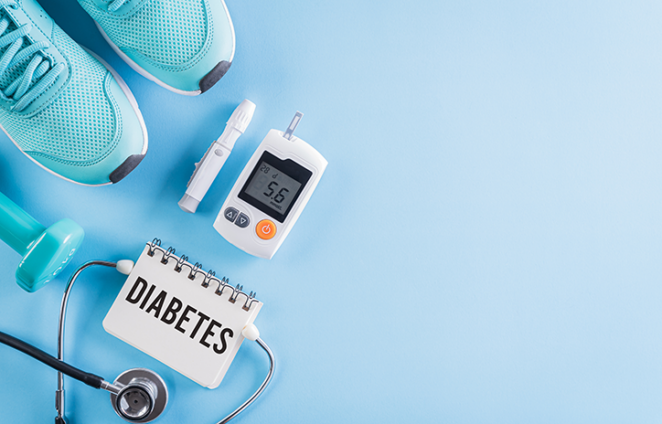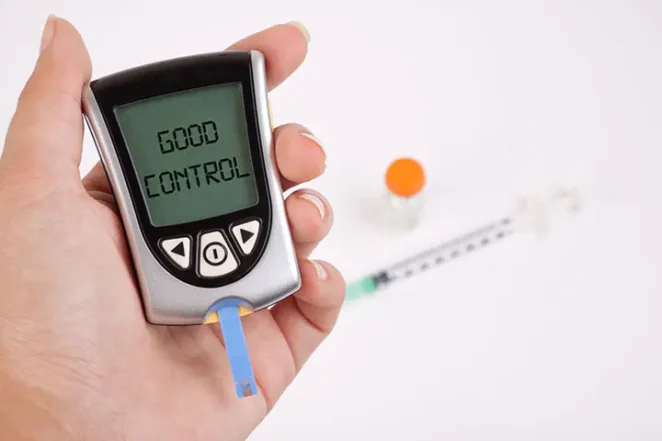You have diabetes if you have consistently high levels of blood sugar. Even though glucose is a vital source of energy for the body, when its levels are too high, it can cause damage to various organs and tissues. Diabetes can lead to several complications if left untreated or poorly managed, including nerve damage, kidney disease, eye damage, cardiovascular disease, and stroke.
There are two main types of diabetes:
Type 1 diabetes: This type of diabetes occurs when the body’s immune system mistakenly attacks and destroys the cells in the pancreas that produce insulin, a hormone helping the regulation of glucose in the blood.
Type 2 diabetes: This type of diabetes occurs when the body becomes resistant to insulin or doesn’t produce enough insulin to control blood glucose levels properly.
What Are the Typical Signs of Diabetes?

Feeling thirstier and need to pass urine more often: A high level of blood glucose can cause the body to lose fluids through urination, leading to dehydration and increased thirst.
Increased hunger: When the body doesn’t produce enough insulin or becomes resistant to insulin, glucose cannot enter cells for energy, leading to increased hunger.
Fatigue and weakness: The body may feel tired and weak when glucose cannot enter cells for energy.
Blurred vision: High blood sugar levels can cause changes in the lenses of the eyes, leading to blurred vision.
Slower curing of cuts and wounds: High glucose levels in the blood can weaken the body’s capacity to heal injuries.
Burning or feeling of numbness in hands and feet: High blood sugar levels can cause nerve damage, leading to a sensation of burning and tingling in the hands and feet.
According to the CDC, it’s important to note that some people with type 2 diabetes may not experience any symptoms at all, especially in the early stages. That’s why it’s important to get regular check-ups with a healthcare provider and to test for diabetes if you have any risk factors, such as being overweight, having high blood pressure or high cholesterol, or having a family history of diabetes.
How to Manage Diabetes

Maintain a healthy diet: Eat a balanced diet with plenty of fruits, vegetables, lean proteins, and whole grains. Avoid sugary foods, processed foods, and saturated and trans fats.
Exercise regularly: Regular exercise can help lower blood sugar levels, improve insulin sensitivity, and promote weight loss.
Monitor blood sugar levels: Check blood sugar levels regularly as directed by a healthcare provider, and keep track of results in a log or journal.
Take medication as prescribed: Take insulin or oral medications as directed by a healthcare provider.
Manage stress: Stress can raise blood sugar levels, so practice stress-reducing techniques like deep breathing, yoga, or meditation.
Quit smoking: Smoking can increase the risk of complications associated with diabetes, so quitting smoking is important for managing diabetes.
Frequently asked questions
- What is diabetes?
Diabetes is a condition in which the body’s ability to produce or respond to insulin, a hormone that helps regulate glucose levels in the blood, is impaired. This can lead to high levels of glucose in the blood, damaging tissues and organs over time if left untreated or poorly managed.
- What are the two main types of diabetes?
The two main types of diabetes are Type 1 and Type 2. Type 1 occurs when the body’s immune system mistakenly attacks and destroys cells in the pancreas that make insulin, while type 2 occurs when the body becomes resistant to insulin or doesn’t produce enough insulin to properly regulate glucose levels in the blood.
- What are the typical signs of diabetes?
The typical signs of diabetes include increased thirst, frequent urination, increased hunger, fatigue and weakness, blurred vision, slower healing of cuts and wounds, burning or numbness in hands and feet. However, some people with type 2 diabetes may not experience any symptoms at all.
- How can diabetes be managed?
Diabetes can be managed by maintaining a healthy diet, exercising regularly, monitoring blood sugar levels frequently, taking medications as prescribed by a healthcare provider, managing stress through relaxation techniques, and quitting smoking. Regular check-ups with a healthcare provider is also important to detect any potential issues early.
- What are the potential complications of diabetes if left untreated or poorly managed?
If left untreated or poorly managed, diabetes can lead to serious complications such as heart disease, stroke, kidney failure, nerve damage, and vision problems. It is important to manage diabetes properly in order to reduce the chances of developing these conditions.
If you have any additional questions about diabetes, it is best to consult with your healthcare provider for more information. They can provide personalized guidance and medical advice on how to best manage diabetes. Additionally, they can help you identify any other health issues that may be contributing to your condition. Taking the right steps towards managing your diabetes can help ensure your long-term health.
- What are the long-term health benefits of managing diabetes?
Managing diabetes can help reduce the risks of developing serious complications such as heart disease, stroke, kidney failure, nerve damage, and vision problems. Regular check-ups with a healthcare provider can also identify any potential issues early on. Additionally, maintaining a healthy diet and exercising regularly can help lower blood sugar levels, improve insulin sensitivity, and promote weight loss. These steps can ultimately lead to improved quality of life and better long-term health.
- What resources are available to people with diabetes?
There are a number of resources available for those living with diabetes. The American Diabetes Association offers educational programs, support networks, and resources to help people living with diabetes. Additionally, there are online support groups and forums dedicated to helping individuals manage their condition. Many healthcare providers also offer specialized advice on how to best manage diabetes, as well as access to advanced treatments such as insulin pumps or continuous glucose monitors.
No matter what your situation is, having a support system and access to resources can be invaluable in managing diabetes. Taking the time to educate yourself on your condition and explore different management strategies may be beneficial as well. Doing so can help ensure that you have the necessary tools for long-term health success.

Conclusion
Blood sugar management is especially important as chronically high blood sugar levels can lead to severe and even life-threatening complications. Regular check-ups with a healthcare provider can help monitor blood sugar levels and identify potential complications. It’s important to work with a healthcare provider to develop a personalized plan for managing diabetes based on individual needs and preferences.




